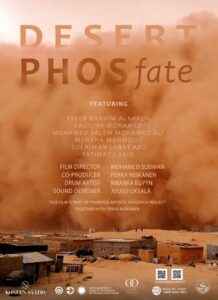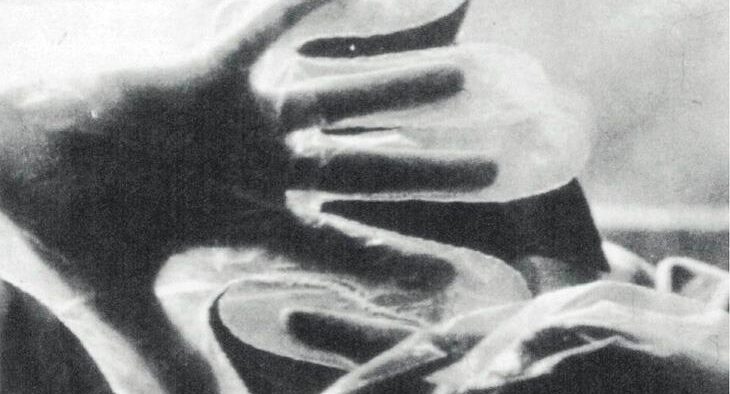Screenings with Mohamed Sleiman Labat
19. November, 4pm-6pm
House Pour Bienne, Kontrollstrasse 22, 2503 Biel/Bienne
French,Arabic / Subtitles French
The Year of Balls 2019, 10min
A short portrait film that tells about one of the years in the Nomadic Calendar where Sahrawi communities and their camel herds were bombarded by French and Spanish air forces. The film was narrated through my father’s recollections and childhood memories and how he witnessed the event as a child. The Year of Balls highlights the colonial violence as experienced by the ordinary Sahrawi families.
DESERT PHOSfate 2023, 59 min
An experimental documentary film by Sahrawi artist Mohamed Sleiman Labat. It weaves through the story of phosphate, exploring the multi-layered narrations about sand particles, plants, human and mineral displacement. The film explores ways of telling about realities, metaphors and poetics in the desert. It highlights connections between ecological justice, colonial practices, environmental violence, traces of anthropocentric mineral extractions, and the loss of indigenous ways of knowing and telling about the world.
________________________________________________________________________________
Antikolonialer Filmblock im Kino Reitschule
Concerning Violence
21. November. Türöffnung und Bar ab 19:30 Uhr, Film um 20:00 Uhr.
Englisch / englische Untertitel
Concerning Violence (von Göran Hugo Olsson) porträtiert antikoloniale Kämpfe in den 1960er Jahren mithilfe von Archiv-Aufnahmen. Die Aufnahmen werden verbunden mit Textausschnitten aus Frantz Fanons Buch „Die Verdammten dieser Erde„, welche von Lauryn Hill gesprochen werden. So stellt der Film eine bildnerische Einführung in die antikolonialen Theorien von Frantz Fanon ein und zeigt wichtige
Widerstandskontexte der Jahre weltweiter Dekolonisierungskämpfe in den 1960ern auf.
5 Broken Cameras
22. November: Türöffnung und Bar ab 19:30, Film um 20:00 Uhr.
arabisch / englische Untertitel
Bil’in im Westjordanland. Im Jahr 2005 kauft sich der Bauer Emad zur Geburt von Gibreel, seines vierten
Sohnes, eine Kamera. Zur selben Zeitbesetzt das israelische Militär ein Stück Land, um Platz für eine jüdische Siedlung zu schaffen – ein Grenzzaun wird errichtet. Emads Freunde setzten sich zur Wehr – gewaltlos. Während Gibreel zu einem Jungen heranwächst, droht die Situation am Grenzzaun zu eskalieren. Verhaftungen und Gewalt bedrohen die Existenz von Emad und dessen Familie. Fünf Jahre, fünf zerstörte Kameras, und jede erzählt ihre eigene Geschichte des Widerstands.
https://www.youtube.com/watch?v=TZU9hYIgXZw
Die Schlacht um Algier (Mit einer Einführung)
24. November. Türöffnung und Bar ab 19:30 Uhr, Einführung und Film um 20:00 Uhr.
französisch und arabisch / deutsche Untertitel
Die Schlacht von Algier ist eine Fallstudie moderner Kriegsführung, die die Taktiken beider Seiten minutiös beschreibt. Sie wurde zu einem veritablen Handbuch für Aufstand und Aufstandsbekämpfung und wurde von den Black Panthers, der PLO, der IRA, südafrikanischen Kämpfern und dem Vietcong bis hin zur Regierung von George W. Bush im Irak studiert. Gillo Pontecorvos Film aus dem Jahr 1966 gilt als einer der einflussreichsten politischen Filme der Geschichte und ist ein düsteres Dokudrama über den Unabhängigkeitskampf der algerischen Nationalen Befreiungsfront (FLN) gegen die französische Kolonialherrschaft in den 1950er und frühen 60er Jahren.
________________________________________________________________________________
Short movie block at Haus Pour Bienne
Wann: Donnerstag, 23. November, 14:00-17:00 Uhr
Wo: Haus Pour Bienne, Kontrollstrasse 22, 2503 Biel/Bienne
One Image, Two Acts
English, Persian / Subtitle English
One Image, Two Acts examines the photographic and film archives of British Petroleum during its operations in Iran, Iraq, and Kuwait to unravel BP’s widespread construction of cinemas in the oil towns of South-Western Iran. It follows the transformation of this emergent image economy in contouring the nationalization movement and the Iranian anticolonial cinema between 1950-1980 and traces the media infrastructures through which oil has operated as an agent of power in the colonial episteme.
The Last British Colony in Africa
English / Subtitle English
The forcible displacement of the entire Chagossian population by the governments of the United Kingdom and the United States, as well as the UK’s racist persecution and continued blockade of their return to their homeland, are crimes against humanity, Human Rights Watch said in a report and video released today. Both governments should provide full reparations to the Chagossian people, including the right to return to their homes in the Chagos archipelago in the Indian Ocean.
